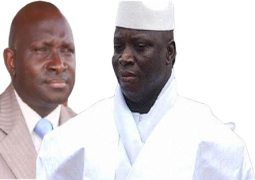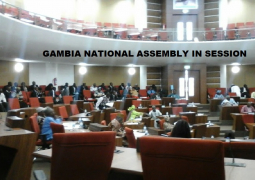The Gambian leader made this statement on Thursday when he was delivering the State of the Nation Address at the National Assembly in Banjul.
“The Gambia relies heavily on imports for the consumption of basic commodities, including wheat and maize from Ukraine,” he said. “This means that the disruption in supply chains, which led to shortages in supply, translated into strong inflationary pressures on the economy.”
According to him, the increase in global oil prices put pressure on government and forced them to subsidize fuel to lower the high pump prices that had a negative impact on domestic revenue mobilization and the 2022 National Budget.
He also said that the government “channels its development endeavors through the public sectors’ policies, projects and programmes they execute.”
“Operational matters, management, and administrative functions are not given prominence, except where they have a direct bearing on administration’s performance or have consequences of national interest,” he pointed out, saying: “My deliberation centers on such interventions, as well as bilateral and multilateral engagement and events of special relevance.”
He added that national development, especially in developing countries, could not be discussed without reference to the pressure that global events and trends bring to bear on low-income nations.
“With less attention on Covid-19, infrastructure development activities resumed and will remain a priority,” he stated, adding that the rural road projects implemented by the Ministry of Transport, Works and Infrastructure, the road expansion and “OIC-related projects are underway as the country prepares to host the OIC summit” by December this year.
“Apart from the Government’s commitment to the Medium Term Economic Framework (2023-2026) to improve macro-fiscal stability, the new Green Recovery-Focused National Development Plan (RF-NDP) has cabinet approval, and preparations are underway to launch it,” President Barrow said.
“The plan outlines key national priorities across the sectors and will guide development interventions in the medium term.”
On agriculture, Barrow said thesector was strongly committed to strengthening its policy environment and programme implementation efforts.
In this respect, emerging challenges would be persistently addressed through new policies and initiatives, he promised.
In the area of communication and digital economy, Barrow said the creation of the Ministry of Communication and Digital Economy “affirms the government’s desire” for rapid digital transformation and utilisation of ICTs for socio-economic development.
President Barrow further informed deputies that fisheries is a key contributor to The Gambia economy, accounting for 10 percent of GDP in 2022 and providing direct employment to cover 30,000 people.
On gender and basic education, the Gambian leaderpinpointed a range of new policies developed by the sector guide, which included the strategic development efforts and program activities of the Ministry of Gender, Children and Social Welfare.
Veering unto education, President Barrow said his government would make education accessible to children from poor families, as well as rural communities.
“My government uses resources from both the domestic budget and development partners to provide innovative ways of reaching underserved areas,” he added.
Read Other Articles In Headlines

Swiss Police investigate clandestine links between Jammeh and Sonko
Jan 12, 2024, 11:47 AM

NAMS defer Public Service Pensions Bill for Monday for a third reading
Feb 16, 2022, 11:13 AM



